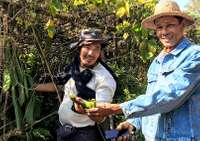Menyoroti Anggota ECHOcommunity: Tn. Tuntun dan Thaung Si 2020-04-08

Kutipan dari laporan oleh Patrick Trail – ECHO Asia
Saat saya berjalan di ladang pertanian bersama Tn. Tuntun di pedesaan Myanmar, saya tidak bisa menahan senyum ketika dia dengan bangga menunjukkan kepada saya biochar yang sekarang dia buat dan gunakan dalam campuran pot untuk bibit pohon buahnya. Alih-alih membakar, ia sekarang mengubah bahan limbah organiknya dari pertanian menjadi sumber daya berharga yang dapat digunakan untuk menghasilkan lebih banyak tanaman, alih-alih kehilangan karbon ke atmosfer melalui asap.
Sekitar satu tahun yang lalu, Tn. Tuntun menghadiri Lokakarya Penghematan Benih di Pyin Oo Lwin dan belajar cara membuat biochar selama salah satu sesi latihan. Dia segera kembali ke rumah dan mencobanya sendiri, dan telah sangat sukses. Tn. Tuntun kini bahkan menjadi tuan rumah halaman Facebook di mana ia berbagi teknik pertaniannya dengan petani berbahasa Burma lainnya, menjelaskan praktik-praktik seperti biochar, di antaranya!

Thaung Si (kiri) dan Tuntun (kanan) memamerkan biji kacang pedang yang berasal dari Bank Benih ECHO Asia dan sekarang sedang berkembang untuk memasok bank benih di sana di Myanmar.
Banyak hal yang terjadi di sini berasal dari mitra utama kami di wilayah ini, Tn. Thaung Si. Sebagai teman lama dan mitra ECHO Asia, Thaung Si telah bergabung dengan kami dalam berbagai acara pelatihan pada banyak kesempatan dan kami juga telah belajar banyak darinya. Tiga tahun lalu ia mendirikan Bank Benih Masyarakat di Lisu Baptist Theological Seminary. Melalui bank benihnya, ia mengajarkan praktik pertanian dan berkebun kepada siswa, dan telah berdampak besar pada banyak kehidupan, menabur benih dari berbagai jenis. Di sinilah Tn. Tuntun dan hampir seratus petani dan peserta lokal lainnya menerima pelatihan tentang Biochar dan teknik lainnya tahun lalu, dan Thaung Si menindaklanjutinya secara teratur.
Komunitas ECHO memiliki banyak mitra yang berdedikasi seperti Thaunag Si di seluruh kawasan, dan di seluruh dunia. Mitra ini, ketika dilengkapi dengan baik, mampu memperlengkapi lebih banyak lagi!